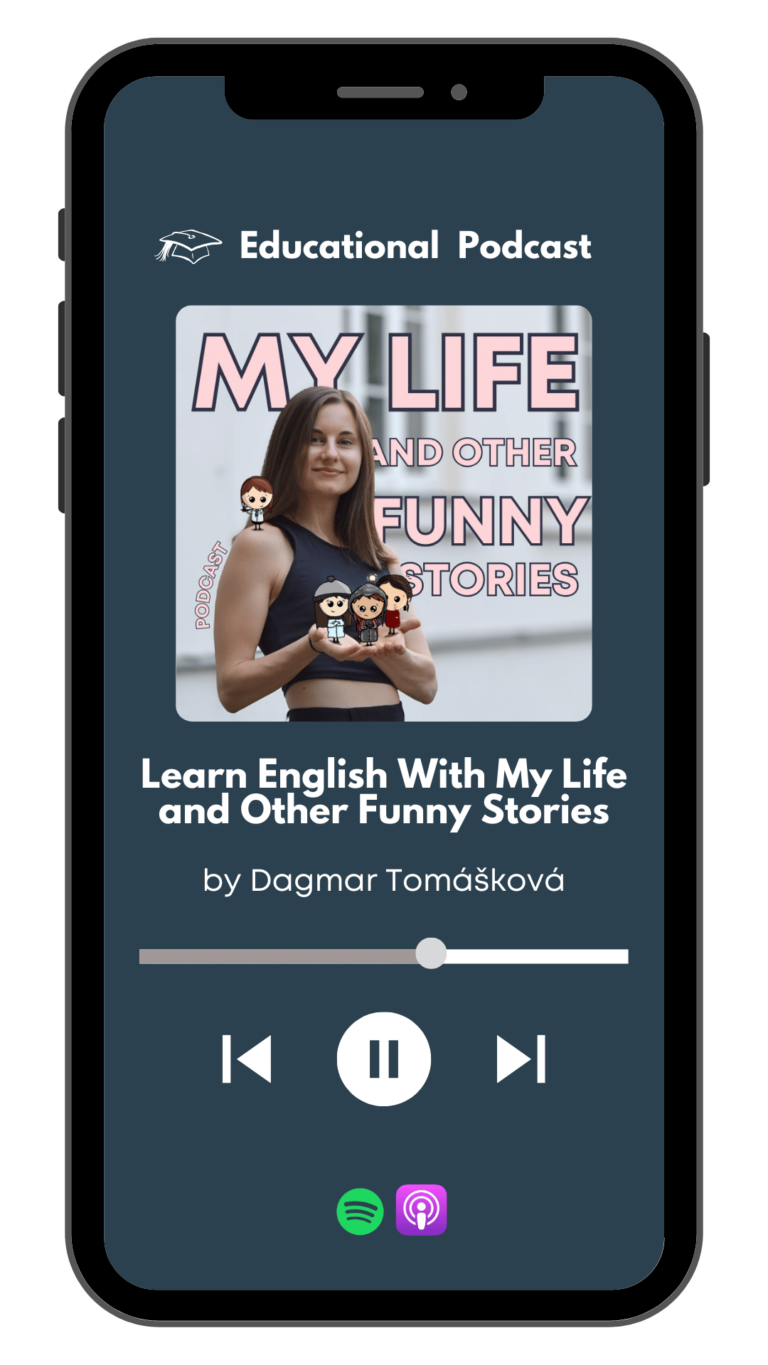
Ep.92: My Experience With Learning a Language With AI (Advantages and Disadvantages)
Today, I wanted to share something quite personal and current: my own experience of learning a language with the help of AI. Because yes, even as an English coach, I am also a language student myself. I’m learning French, and AI has become a surprisingly big part of my routine. So let’s look together at what I’ve found out… the good and the bad.

LISTEN TO THE EPISODE HERE:


WRITTEN TRANSCRIPTION OF THE PODCAST
Hello and welcome to my podcast My Life and Other Funny Stories. My name is Dagmar Tomášková. I’m an English tutor and coach, and I created this podcast for English students who want to improve their oral comprehension. As always, you can find the transcript of this episode and a vocabulary list in the notes of the podcast.
Today, I wanted to share something quite personal and current: my own experience of learning a language with the help of AI. Because yes, even as an English coach, I am also a language student myself. I’m learning French, and AI has become a surprisingly big part of my routine. So let’s look together at what I’ve found out… the good and the bad.
Let’s start with the advantages, because honestly, there are many, of course.
Firstly, it’s incredibly helpful and can actually be fun. Talking to AI or texting in another language feels like chatting with a super patient language partner who never gets tired of your mistakes. I mean, I don’t think my French teacher would get tired of it but you know what I mean.
Secondly, you can practice anytime and anywhere. You don’t have to wait for your teacher or book a class. You can open your app at midnight, on the bus, or even during your lunch break. I really love this flexibility.
Thirdly, AI can create exercises just for you. If you struggle with a specific grammar topic, you can simply ask it to make you a quiz, some fill-in-the-blanks, or even a short dialogue. That’s something I use even as an English teacher. It is a great help.
Another advantage is that it’s mostly free. Of course, there are paid apps – I pay for TalkPal, for example- but you can do so much even with the free versions.
And an extra point: you can try risky things without feeling embarrassed or talk about something very special to you. You can experiment with slang, test new phrases, and no one can hear you. On the other hand…no one can hear you. I mean, people listening to you is the whole point of communication.
Which brings me to the disadvantages. Because it’s definitely not perfect.
One big issue: you don’t know what you don’t know. AI will correct your mistakes if you make them, but it’s harder to make it introduce new grammar to you in a structured, natural way. Sometimes it just reacts instead of guiding.
Another disadvantage: the feedback can be overwhelming. If it corrects every tiny mistake, you end up with a wall of corrections, and it’s hard to focus on what really matters.
Also, it can feel quite cold and mechanical. You don’t build any real relationship with AI. There’s no shared laughter, no personal connection, no friendship being made and the jokes that AI says are not funny at all. And that matters.
The conversation can also feel a bit one-sided. AI always waits for you to start or guide the topic, which can be tiring, especially if you don’t know what to ask or talk about.
Another thing I noticed: sometimes it takes a few tries to get AI to give you what you actually want. You need to learn how to ask it in the right way. And that can be frustrating.
The tone of the feedback can be off too. Sometimes AI is overly positive and you feel like you’re doing perfectly, and other times it’s too critical and you end up feeling discouraged. It also doesn’t really prioritise the most important mistakes. It just gives you everything.
And another big thing, which is one of the biggest disadvantages, there’s no accountability. No one is waiting for you to come to class, and if you skip your AI practice, literally no one notices or cares. And unfortunately, many people need this accountability. It is so easy to give up when you feel like there is no point.
And you need to be the one asking for things, which is hard when you’re not sure what your weaknesses are or what to study next.
Another funny paradox: it’s free, which is amazing, but research shows that when we pay for something, we take it more seriously. So free tools can be easy to drop. I just feel like people don’t appreciate things for free, even when they are valuable.
A few more things I thought about: AI can’t adapt to your mood or energy level the way a human teacher can. It doesn’t say “You seem tired today, let’s do something lighter.” It doesn’t see your facial expressions or hear the tone of your voice. And it can’t share real-life experiences or cultural stories or…funny stories. For me, it is super important for my students to have a good time on our lessons and very often, we laugh together, we joke together and AI has never given me anything like that.
And that brings me to my final point: you can’t fully replace real human interaction. Language isn’t just words and grammar – it’s also about connection, humor, shared understanding, and culture..also, a person will always react differently than a machine. So if you want to practice real conversations, practicing with REAL people will always be better. AI can help, but it can’t fully give you that.
Also, please, for the love of god, AI can be your helper but it really can’t work for you in every area of your life. Yes, it can write emails and essays for you, it can do bunch of crazy shit but remember, if you want to be independent in a foreign country, if you want to get rid of your stress, if you want to improve your brain and mind, if you want to feel the liberty that speaking English gives you, don’t let AI do all your work for you. To be honest, I can smell a text written by AI from miles away, and if any of my students are listening to this episode, I allow you to use AI to correct your mistakes but don’t you dare send me a text written by Chat GPT. I know, I will always know. Also, you would only be cheating yourselves.
So in conclusion, as I always said in my English essays at the end, AI is an amazing tool. But it shouldn’t be the only thing you use. It’s best combined with real people, real conversations, and ideally, a teacher or coach who can guide you. I, personally, still work with a real language tutor because AI is just not the same. I love recording voice messages with the feeling that an actual human will listen. I love getting feedback from someone who’s lived through many French conversations. But that’s just me, maybe you feel differently about it.
That’s it for today! Let me know if you’ve tried learning with AI too. What works for you? What frustrates you? I’d love to hear your experience.
Thank you so much for listening. If you liked this episode, please leave a five-star rating and share it with your friends or send it to…I don’t know, your mom. And don’t forget, you can find the transcript and vocabulary list in the podcast notes. See you next time!

VOCABULARY LIST
surprisingly – překvapivě
flexibility – flexibilita, pružnost
specific – konkrétní
embarrassed – v rozpacích, ztrapněný
experiment – experimentovat
disadvantages – nevýhody
introduce – představit, zavést
overwhelming – zahlcující
one-sided – jednostranný
frustrating – frustrující
accountability – zodpovědnost, nutnost se zodpovídat
appreciate – ocenit
facial expressions – výrazy obličeje
independent – nezávislý
liberty – svoboda
cheat – podvádět
in conclusion – na závěr
combined – kombinovaný, spojený
guide – vést, provázet